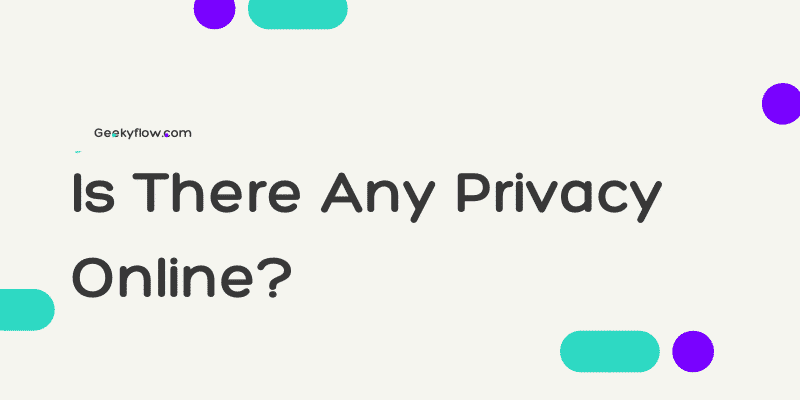Is there any privacy online?

How safe do you feel about the data you’re sharing online? If you’re like most people, you probably take some measures to ensure that your activities can’t be immediately traced back to you. And also like most people, you probably believe that you’re evading watchful eyes pretty successfully.
The truth is that you probably aren’t. If you do anything online, it’s recorded, and often in a way that can eventually link it back to you. The fact that it’s not happening to the average person is simply because most people aren’t of any real interest to authorities or others with access to that information. But make no mistake, many websites you use on a regular basis probably know a lot about your life – perhaps even more than you do in some respects.
Contents
Alternate/Throwaway Accounts
Sites like Reddit and Twitter have popularized the idea of creating “throwaway” accounts, which many people use to speak their minds more freely and express opinions that they don’t want to be associated with their real identities. And while this could fool other members of the platform you’re posting on, it does absolutely nothing to prevent the site owners themselves from connecting the dots.
You could take things further and use a proxy to make it more difficult for the systems to link your profiles, and if you post anything too sensitive, you probably should. However, if you’re hearing about proxies for the first time, head over to the Smartproxy blog to find out more.
Advanced AI algorithms study your behavior patterns, analyzing things like the way you express yourself, your average schedule, and even minor details like the way you click around the website. All of this is commonly referred to as digital fingerprinting, and it’s gotten quite complex in recent times. In fact, those “secret” accounts are quite valuable to platforms for marketing purposes because they are a window into your darker side, the parts of your mind that you normally wouldn’t express openly.
Encrypted Chats
It’s become quite common for messaging apps to boast about having great end-to-end encryption. Many people trust that this keeps their communication safe. In the end, though, your messages are still passing through a centralized server infrastructure. Do you have any guarantee that your app isn’t simply sharing your private encryption keys with the main server? You have no way of verifying that.
Like secret accounts, encrypted chats can entice people into sharing details that they might not want to eventually link back to them. The reality is that you should assume that everything you say online is recorded somewhere and linked to your real name. It gets even worse if you’re using those platforms to discuss illegal activities. It hasn’t been proven, but there are strong rumors that government entities have backdoors in all popular encryption models, and you would never even know if your data has leaked because of something like that.
“Anonymous” Activity
But hey, some sites at least allow you to act anonymously, right? No need to even make an account or you can go “invisible” and perform actions that don’t show up in your history. All of that is pointless. Companies have no real interest in allowing you to evade their detection algorithms, but they do have a lot to gain from lulling you into a false sense of security. As we mentioned above, actions you take under these circumstances tend to expose much more about you than your regular online activities.
This information is quite valuable to those trying to sell you things or exploit your data for other reasons. Facebook says that reports you submit against others are anonymous and they are never linked to your name. If that is the case then why can you see a full history of all reports you’ve submitted in your own profile? It doesn’t take a lot of thinking to realize that the data is still there and linked to your identity.
Cryptocurrencies
Cryptocurrencies have been gaining a lot of popularity as a way to “beat the system” and exchange money anonymously. But the reality is that they are actually worse than regular financial transactions if your goal is to stay undetected. Due to the way cryptocurrencies work, you can always see the full transaction history of a certain “wallet” publicly. Sure, that wallet is nothing more than a series of random letters and numbers to a random observer. But you’re going to want to convert that crypto to real money at some point in almost every case. And when you do, you leave a permanent trace that can be linked directly to your “normal” financial accounts by someone with the right knowledge.
That’s part of the reason why governments haven’t cracked down on cryptocurrencies more heavily. Letting people believe that they are evading detection for their transactions can be a powerful tool for identifying illicit activities and tracking them more closely. There’s practically no way to send or receive money anonymously these days, other than exchanging cash. Anything you do online can be traced back to you, and if there’s enough interest in your activities, it will at some point.
This doesn’t have to make you feel depressed about the state of affairs. It must, however, serve as an eye-opener and make you realize that you need to be careful about the way you act on the internet. Always do everything with the assumption that it can come back to bite you. It might not happen tomorrow, or even in a few years. But your data is always being used to improve marketing algorithms, and if one day you catch the attention of the wrong organization, they will have a lot more to work with than you might expect.
